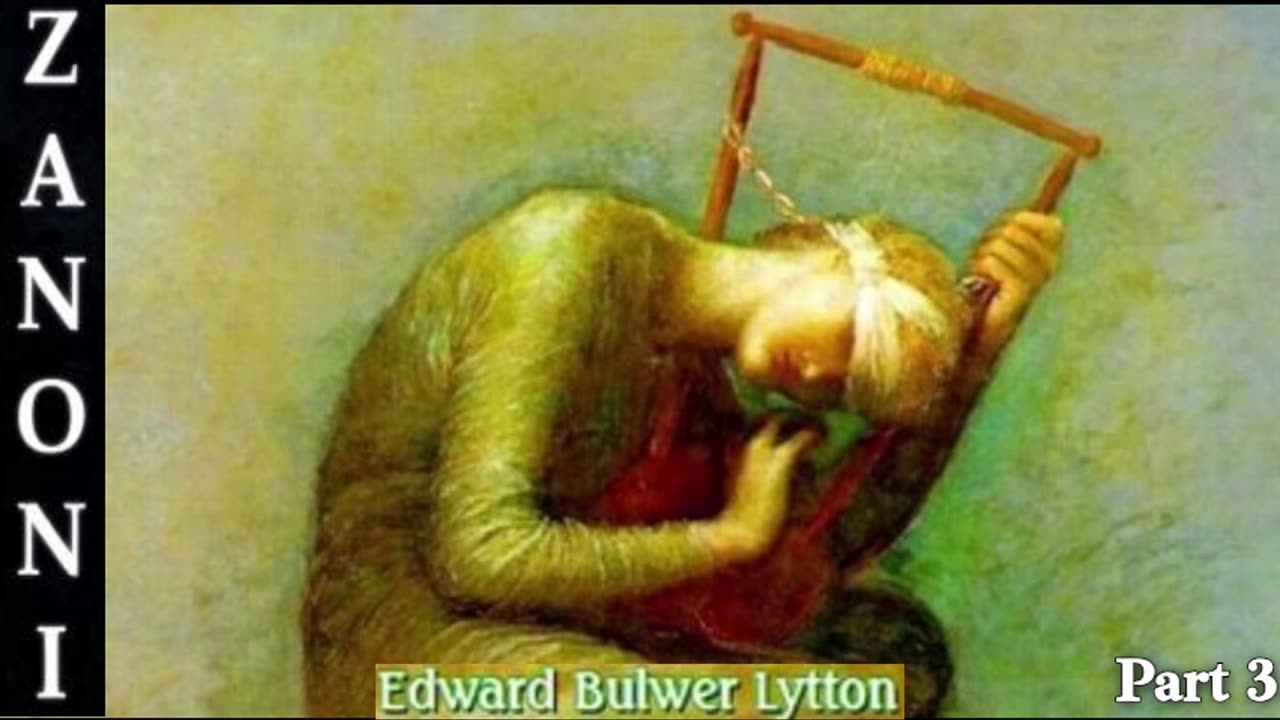Premium Only Content

Zanoni by Edward Bulwer Lytton (1842)
"Zanoni" by Edward Bulwer-Lytton, first published in 1842, is a romantic occult novel that blends mysticism, philosophy, and esoteric themes with a story of love and transcendence. The novel is notable for its exploration of immortality, spiritual enlightenment, and the struggles between earthly desires and spiritual purity.
Plot Overview:
The story follows two central characters: Zanoni, an immortal Rosicrucian adept who has mastered ancient mystical secrets, and Mejnour, his counterpart and fellow adept who has renounced emotional ties and lives solely in pursuit of spiritual knowledge. Zanoni, though capable of remaining detached from humanity and the material world, falls in love with Viola Pisani, a beautiful opera singer. His love for her puts him at odds with the Rosicrucian philosophy, which demands detachment from worldly desires to maintain immortality and spiritual power.
Zanoni’s internal conflict grows as his love for Viola deepens, and he becomes torn between the eternal spiritual life he has cultivated and the mortal emotions of love and attachment that could cost him his immortality. Meanwhile, Mejnour remains steadfast in his spiritual isolation, warning Zanoni of the dangers of his emotional involvement with mortals.
Set against the backdrop of the French Revolution, the novel also follows Glyndon, a young Englishman who seeks mystical knowledge and becomes entangled in the affairs of Zanoni and Mejnour. Glyndon’s pursuit of occult wisdom exposes him to the dangers of power without discipline, as he struggles to reconcile his desires for knowledge with his lack of preparation.
Key Themes:
1. The Duality of the Spiritual and Material Worlds:
The novel explores the tension between spiritual enlightenment and worldly desires. Zanoni represents the spiritual ideal, capable of transcending death and worldly suffering through the mastery of ancient wisdom. However, his love for Viola pulls him toward the material world, risking his spiritual purity and immortality.
2. Love vs. Immortality:
Zanoni’s love for Viola forms the emotional core of the novel. This relationship symbolizes the eternal conflict between love (representing human frailty, passion, and mortality) and immortality (which demands detachment from such emotions). Zanoni must ultimately decide whether to remain immortal or surrender to his human love, with profound consequences.
3. The Quest for Knowledge and Power:
The novel delves deeply into the theme of esoteric knowledge. Both Zanoni and Mejnour possess ancient mystical wisdom that grants them power and immortality. However, the novel warns of the dangers of seeking such knowledge without the proper spiritual and emotional preparation, as seen in Glyndon’s failed attempts to follow their path.
4. The Occult and Rosicrucianism:
Rosicrucian themes pervade the novel, particularly the belief in spiritual enlightenment through ancient knowledge and the concept of immortality. The Rosicrucians were an esoteric order that pursued the hidden truths of the universe, and Lytton draws heavily on their traditions to create a mystical atmosphere throughout the book.
5. The French Revolution as a Backdrop:
The chaotic, violent period of the French Revolution provides a stark contrast to the mystical and philosophical world of the Rosicrucians. It serves as a reminder of the fragility of human societies and the upheaval caused by materialistic and worldly struggles. Zanoni, as an outsider, observes these events and is deeply affected by the intersection of his personal journey with the tumult of revolution.
Style and Structure:
"Zanoni" is written in a Victorian Gothic style, with elaborate descriptions, rich symbolism, and philosophical discussions. The novel blends romance with esotericism, using the personal struggles of the characters to explore broader philosophical and spiritual questions.
Bulwer-Lytton employs the first-person narrator who discovers and presents Zanoni’s story, adding a layer of mystery and making the reader feel as if they are being introduced to ancient knowledge.
Impact and Influence:
"Zanoni" remains one of Bulwer-Lytton’s most influential works, particularly among readers interested in occult fiction. It had a lasting impact on later writers of esoteric literature, including Madame Blavatsky and other figures in the Theosophical movement. The novel’s exploration of Rosicrucian themes, immortality, and the occult has made it a key text for those studying the Western mystery traditions.
About the Author:
Edward Bulwer-Lytton (1803-1873) was a notable English novelist, playwright, and politician, renowned for his extensive literary contributions as well as his involvement in various intellectual and esoteric circles. He was born into an aristocratic family and became one of the most popular writers of his time, with works spanning multiple genres, including historical fiction, romance, the supernatural, and early science fiction.
Masonic and Esoteric Affiliations:
Freemasonry:
Edward Bulwer-Lytton was initiated into Freemasonry, becoming an active member of the craft. While specific details about the degrees he achieved or the exact lodges he was associated with are not widely documented, it is known that Freemasonry's symbolic and philosophical teachings had a significant influence on his writing. His novels, such as Zanoni and The Coming Race, reflect themes common in Masonic philosophy, such as the pursuit of hidden knowledge and the moral implications of power.
Rosicrucianism:
Bulwer-Lytton was closely connected to the Rosicrucian movement, an esoteric order that focuses on spiritual enlightenment and the pursuit of mystical knowledge. His novel Zanoni is often cited as a Rosicrucian allegory, exploring the journey of an initiate through trials and transformations leading to higher consciousness and immortality. The philosophical and mystical ideas presented in his works align closely with the Rosicrucian worldview.
Occult Interests:
Bulwer-Lytton had a deep interest in the occult, including mesmerism (a precursor to hypnotism), spiritualism, and other mystical practices that were popular during the Victorian era. His exploration of these subjects is evident in his literature, where he often depicted the supernatural and the unseen forces that influence human life.
Influence on Later Esoteric Movements:
Although Bulwer-Lytton was not directly affiliated with later organizations such as the Hermetic Order of the Golden Dawn, his work had a considerable impact on the members of this and other esoteric societies. His portrayal of secret knowledge and advanced spiritual practices in his novels provided inspiration for many occultists in the late 19th and early 20th centuries.
Edward Bulwer-Lytton’s literary and esoteric legacy is significant, with his novels continuing to be studied for their symbolic content and insights into the mystical philosophies that captivated him. His influence extends beyond literature into the realms of occultism and mysticism, where his exploration of hidden knowledge and spiritual power remains of enduring interest.
-
 47:13
47:13
Deus Meum Que Jus
1 month agoWilliam Cooper - Michael Schiffman, World Parliament of Religion - 9.8.93
602 -
 1:18:37
1:18:37
We Like Shooting
12 hours ago $0.41 earnedDouble Tap 391(Gun Podcast)
5.04K -
 2:32:43
2:32:43
FreshandFit
12 hours agoAndrew Wilson VS Gary The Numbers Guy Astrology & Numerology Debate!
83.7K49 -
 9:22:40
9:22:40
Dr Disrespect
10 hours ago🔴LIVE - DR DISRESPECT - TRIPLE THREAT CHALLENGE - RIVALS, PUBG, WARZONE
197K38 -
 1:15:03
1:15:03
Dad Dojo Podcast
9 hours ago $0.93 earnedEP16: Parenting: Then vs Now
23K -
 53:58
53:58
Sarah Westall
3 hours agoBlack Pilled vs Learning Reality and Maintaining Perspective, AI Reality w/ Johnny Vedmore
38.5K -
 55:01
55:01
LFA TV
1 day agoJan. 6, 2021, vs. Jan. 6, 2025 | TRUMPET DAILY 1.6.25 7pm
28.1K1 -
 1:19:27
1:19:27
The Big Mig™
1 day agoLimitless Health with Calley Means
35.5K7 -
 1:37:26
1:37:26
Redacted News
7 hours agoBREAKING! Trump Effect is Real Justin Trudeau Resigns in Disgrace
154K219 -
 49:08
49:08
Kimberly Guilfoyle
7 hours agoEnding Injustice and the 100 Day Agenda, Live with Joseph McBride and Mark Lucas | Ep. 186
47.5K6